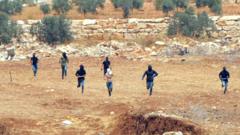As regional conflicts unfold, Rwanda is cultivating its image as a peaceful and attractive investment and tourism hub, utilizing soft power to navigate international criticism.
**Rwanda Leverages Its Soft Power Amid Regional Turmoil**

**Rwanda Leverages Its Soft Power Amid Regional Turmoil**
Rwanda's strategic focus on sports and investment aims to mitigate backlash from its military involvement in the DRC conflict.
The ongoing conflict in the Democratic Republic of Congo (DRC) prompted Rwanda to ramp up its efforts in promoting itself as a key security ally while simultaneously establishing a reputation as an inviting destination for athletes, tourists, and investors. Despite the involvement of Rwandan troops in the controversy surrounding the M23 rebel group's resurgence, Rwanda has hosted an international cycling tournament and a tech conference as well as a concert featuring global artist John Legend in Kigali, illustrating its strategy to diversify economic engagement.
Analysts note that the domestic situation and international perception of Rwanda are at a precarious intersection. The country has faced reproach from major countries like the U.S. and China over its military actions; however, these criticisms have not significantly affected its attractiveness for foreign direct investments and tourism. Many service-oriented sectors continue to thrive, supported by Rwanda's image as a clean, organized, and safe environment, especially in contrast to the instability nearby.
Political commentators suggest that Rwanda, under the leadership of President Paul Kagame, seems to be banking on its soft power. As tensions exude from the DRC, Rwanda's positioning as a regional stabilizer becomes crucial in deflecting international scrutiny. They argue that Rwanda has calculated that potential backlash may lack organization among international actors, allowing it to navigate this tumultuous situation without significant repercussions.
"Rwanda appears to have recognized the momentary absence of coordinated pressure and believes it can outlast the current critique," says Murithi Mutiga, Africa director at the International Crisis Group. Additionally, with shifting priorities and changes in U.S. foreign aid strategies, Rwanda is optimistic that it can leverage its position without overt military implications.
As Rwanda continues to cultivate its international profile, it stands at a crossroads, balancing its military engagements with a robust focus on hosting events that attract the global community—ultimately striving to foster long-term economic and social stability within a complex regional landscape. The contrasting narrative of war and investment might illustrate a unique survival strategy where soft power reigns, at least for the time being.


















